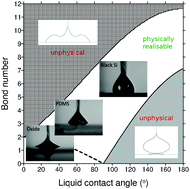When is a surface foam-phobic or foam-philic?
Abstract
It is commonly assumed that the liquid making up a sessile bubble completely wets the surface upon which the bubble lies. However, this need not be so, and the degree of wetting will determine how well a collection of bubbles – a foam – sticks to a surface. As a preliminary to this difficult problem, we study the shape of a single vertical soap film spanning the gap between two flat, horizontal solid substrates of given wettabilities. For this simple geometry, the Young–Laplace equation can be solved (quasi-)analytically to yield the equilibrium shapes, under gravity, of the two-dimensional Plateau borders along which the film contacts the substrates. We thus show that these Plateau borders, where most of a foam's liquid resides, can only exist if the values of the Bond number Bo and of the liquid contact angle θc lie within certain domains in (θc,Bo) space: under these conditions the substrate is foam-philic. For values outside these domains, the substrate cannot support a soap film and it is foam-phobic. In other words, on a substrate of a given wettability, only Plateau borders of a certain range of sizes can form. For given (θc,Bo), the top Plateau border can never have greater width or cross-sectional area than the bottom one. Moreover, the top Plateau border cannot exist in a steady state for contact angles above 90°. Our conclusions are validated by comparison with both experimental and numerical (Surface Evolver) data. We conjecture that these results will hold, with slight modifications, for non-planar soap films and bubbles. Our results are also relevant to the motion of bubbles and foams in channels, where the friction force of the substrate on the Plateau borders plays an important role.



 Please wait while we load your content...
Please wait while we load your content...